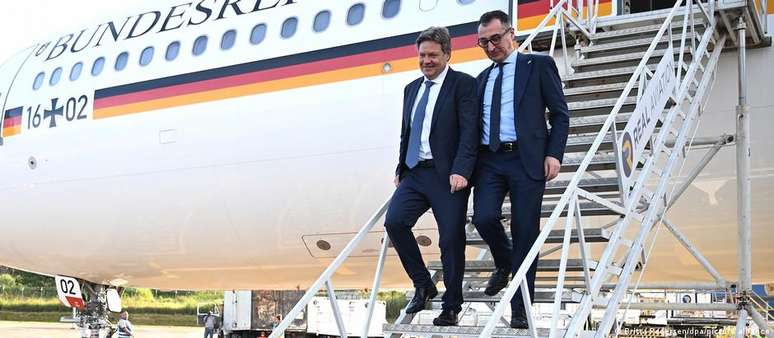With Lula’s government, Europeans see a guarantee of environmental protection. On a visit to Brazil, the German Federal Vice Chancellor, Robert Habeck, defends a speedy conclusion of a free trade agreement between the European Union and Mercosur. Frozen since his signing in 2019, after twenty years of negotiations, the trade pact should be resumed in an attempt to conclude it in the first half of 2023.
“What has changed between 2019, when the technical discussion has been finalized, and now it is the arrival of President Lula,” Habeck told DW during a conversation with reporters this Monday (03/13) as part of the 39 ° Brazil-Germany economic meeting, in Belo Horizonte.
Lula’s promise to end illegal deforestation by 2030 is a strong signal, according to the Germans, that future trade with the end of tariff barriers will take place without environmental destruction.
“This is a strong reason to go ahead with the agreement. The Lula government has credibility because it has already done so. It was a goal that has already been achieved [reduzir o desmatamento]before everything got worse,” the minister said, referring to the high rate of forest devastation recorded in the administration of Jair Bolsonaro.
During the former president’s term, the rate of deforestation in the Amazon increased by 59.5% compared to the previous four years. The deforestation alert data from the National Institute for Space Research (Inpe) indicate a 22% drop in the accumulated result for the first two months of this year compared to the same period in 2022.
While showing confidence in Lula, Habeck underlines that it is necessary to ensure that the probable growth of Brazilian production, stimulated by the new phase of trade with the European Union, does not prevent Brazil from banning the illegal cutting of native vegetation in the coming years. seven years, according to the announced goal.
For Dinamam Tuxá, lawyer and executive coordinator of the Articulação dos Povos Indígenas do Brasil (Apib), the agreement must provide for the protection of all national biomes, not just the Amazon. “The increase in agricultural production cannot go to indigenous territories and traditional communities. There cannot be an increase in socio-environmental conflicts”, she adds, underlining the need to resume the demarcation of indigenous lands.
Brazil closer to Europe
With the largest area and population among Latin America’s neighbors, Brazil is the top destination for German products in the region. In an international scenario of growing tensions between the United States and China, and with the war between Russia and Ukraine very close to its territory, Germany seeks to strengthen relations with Latin Americans to maintain the dynamics of its economy.
“It is also important that Brazil finalizes the agreement. President Lula recently visited Argentina and Uruguay with the aim of strengthening the Mercosur countries and moving forward,” said Geraldo Alckmin, Vice President and Minister of Development, Industry , Commerce and Services, during a meeting with Habeck.
Both said they were against the reopening of already concluded discussions. According to the German minister, the products listed in the pact are subject to taxes ranging from 15% to 50%, which makes trade more expensive and reduces the competitive advantage of the two economic blocs.
“This agreement provides for specific, gradual, staggered, very well organized reductions for some products. This is already negotiated, it is ready, it is a very complex issue. We do not want to open the discussion, this will be the basis of the agreement”, Habeck highlighted .
Among the European countries, Holland has already expressed its opposition to the completion of the pact. The country’s agricultural producers fear that the end of tariff barriers will generate unfair competition with Brazilians.
Opportunity for reindustrialization
A study conducted by the Brazilian Trade and Investment Promotion Agency (ApexBrasil) points out that Brazil can benefit from tax elimination immediately, or in up to four years, by exporting products that go beyond agricultural commodities, such as machinery, chemicals and other manufactured goods.
According to the agency, the share of commodity exports to the bloc increased from 35.8% to 53.7% between 2012 and 2021. Crude oil, soybeans, feed bran, iron ore and coffee are the leader of the list.
For Ricardo Alban, president of the National Confederation of Industry (CNI), the moment must be seized, especially with the reactivation of the ministry coordinated by Vice President Alckmin.
“We will work in a complicit and aligned way so that the moment is not wasted, regardless of misunderstandings or previous understandings. We must look forward,” Alban told DW.
“Matter of Survival”
In Brasilia, Habeck signed a joint statement with the Brazilian Minister of Mines and Energy, Alexandre Silveira, to step up cooperation in the field of energy policy. The statement underscores both governments’ determination to build a green hydrogen economy.
“Germany invests because it’s a matter of survival, getting out of dependence on Russian gas. This is the other ‘hidden’ side of the energy transition coin. And of all the developing countries, Brazil is the one with the greatest energy potential. in Germany’s interest that Brazil stimulate the production of green hydrogen using this potential at one of the most competitive costs in the world”, analyzes Nivalde Castro, coordinator of the Electric Sector Study Group (Gesel), at the Federal University of Rio de Janeiro (UFRJ).
In addition to the production and export of green hydrogen, Brazil has the potential to supply biofuels. “The agreement can have a significant impact on the sector. If there is a special chapter dedicated to renewable energies and biofuels, an important market could open up”, analyzes Erasmo Carlos Battistella, president of BSBIOS.
The company was the first Brazilian to export this product to the European Union and the United States. With an annual production of 1 billion liters of biodiesel per year, up to 15% of this total is sold on the foreign market.
Battistella knows, however, that he will have to face the mistrust of European consumers. Up to 70% of biodiesel is made from soybeans, the production of which is constantly questioned in Europe due to indirect links to illegal logging in the Amazon.
The solution, Battistella defends, is the traceability of the raw material. “The most honest way to resolve this doubt is to define the standards and carry out the certification. It is a technical discussion on the analysis of the product life cycle, from the farm to the wheel. In this way it is possible to exploit renewable sources which help reduce the greenhouse gas effect and decarbonise economies, as Germany wants to do”, he comments.
Source: Terra
Rose James is a Gossipify movie and series reviewer known for her in-depth analysis and unique perspective on the latest releases. With a background in film studies, she provides engaging and informative reviews, and keeps readers up to date with industry trends and emerging talents.


![It All Begins Here: What’s in store for Tuesday 21 October 2025 Episode 1289 [SPOILERS] It All Begins Here: What’s in store for Tuesday 21 October 2025 Episode 1289 [SPOILERS]](https://fr.web.img3.acsta.net/img/99/48/99481db5c03e1ff295fce95b23125991.jpg)



